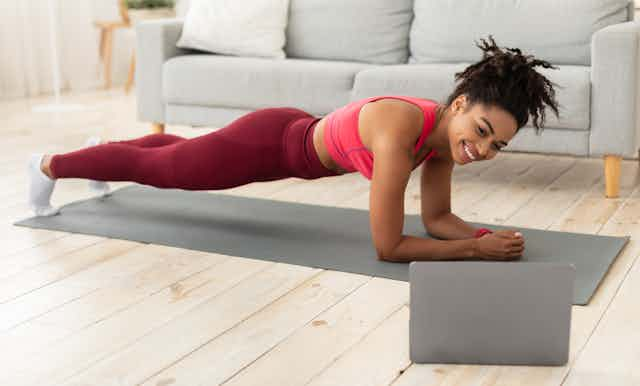Every January, New Year’s resolutions regarding exercise means there’s a surge in intentions be more physically active. Typically, gyms and recreation centres see a boost in membership sales and attendance at the beginning of the year.
However, the restrictions placed in response to COVID-19 have encouraged many to turn to digital alternatives for exercising. One popular avenue for digital fitness is YouTube. Early in the pandemic, YouTube fitness creators saw dramatic increases in their popularity.
It’s clear that these YouTube fitness videos represent an accessible, free and convenient means to engage in pandemic-safe forms of exercise. What’s less clear to researchers is how YouTube fitness videos compare to traditional in-person instruction.
Behaviour change techniques
As physical activity and digital health researchers, my colleagues and I were interested in whether YouTube fitness creators used any behaviour change techniques in their videos to improve exercise practice and adherence. Behaviour change techniques are established strategies that can help to prompt, motivate and/or sustain behaviour changes like exercise. They include things like setting goals, planning for action, repetition and self-monitoring progress.

In a study to be published in Journal of Health Psychology, we looked at the 15 most popular YouTube fitness channels (as of Dec. 31, 2020) and studied the top five most popular videos for each channel to see what kinds of behavioural change techniques they used, if any.
Overall, videos used on average 12.5 behaviour change techniques. The most frequently used ones were demonstration of the behaviour, instruction on how to perform the behaviour and unspecified social support, which includes things like encouraging and motivating words.
How the videos introduced the behaviour change techniques also varied. For example, some creators didn’t talk during their workouts, while others voiced-over their workouts or spoke while working out. One channel, Roberta’s Gym, didn’t even feature a real person exercising, but rather a 3D model of a person performing the exercises.

The number of behavioural change techniques used also ranged from only one to 27. In fact, many of the behaviour change techniques that are frequently used with in-person training such as setting goals, creating plans or giving feedback, were mostly absent in these videos — likely a limitation of the video format.
We were also interested in whether the number or type of behavioural change techniques used was related to the popularity of a creator’s videos. Surprisingly, neither the number of behaviour change techniques used nor the use of any specific one was associated with a video’s views, likes or comments.
From this, we gather that there are likely other factors that play a role in a video or creator’s popularity. It may be that people may relate to the look of a video, the instructor’s personality or the type of workouts that a particular creator has. The enjoyment or entertainment value of videos may also contribute to this popularity.
5 tips for choosing YouTube fitness videos

For those looking to find a YouTube fitness channel that can help them stick to their exercise-related New Year’s resolutions, or just as a fun and accessible alternative to other forms of exercise, here are a few tips:
1. Sample around
Don’t feel limited to just what’s popular. We’ve listed some of the most popular channels here, but there are hundreds (if not thousands) of YouTube fitness creators. Our study found that the more popular channels didn’t necessarily use more behaviour change techniques, so if you’re the type of person who benefits from more encouragement and structure, refer to our list of who is using more of them.

2. Find what fits you and your schedule or routine
Among the top 15 channels we examined, nearly all of them incorporated high-intensity interval training (HIIT) in their videos. A lot of people like HIIT and there are established benefits to practising it in terms of both health and time. However, if the idea of a high-intensity workout puts you off, then there are plenty of popular creators that focus on longer, more steady workouts or workouts aimed at beginners.
3. Do more of what you like
A YouTube fitness channel that leaves you feeling accomplished, capable and energized after a workout is a great indication that you’ve found something that works. The better people feel about themselves and the exercise they’ve done is a strong predictor of whether they will return to exercise again.
4. Mix it up
As previously mentioned, there is no end to the fitness content on YouTube. From bodyweight exercises to yoga, dancing, weight training or walking, there are countless ways to change up what your workout looks like. Keeping exercise interesting is a great way to keep sticking to goals.
5. Take part in the community
Feeling socially supported can help people stay motivated to exercise and overcome barriers that may arise. Many creators run fitness challenges or have social media pages where you can interact with others who are also following the same videos. Some creators also host live workouts, where you can show up at a certain time and follow along and chat with them in real time.
Bringing in a friend or family member who would enjoy working out (or the results thereof) can help keep both of you accountable to your goals.
As gyms and recreation centres rotate between restrictions and guidelines for when and how they can operate, YouTube fitness videos present an entertaining and valuable alternative.

